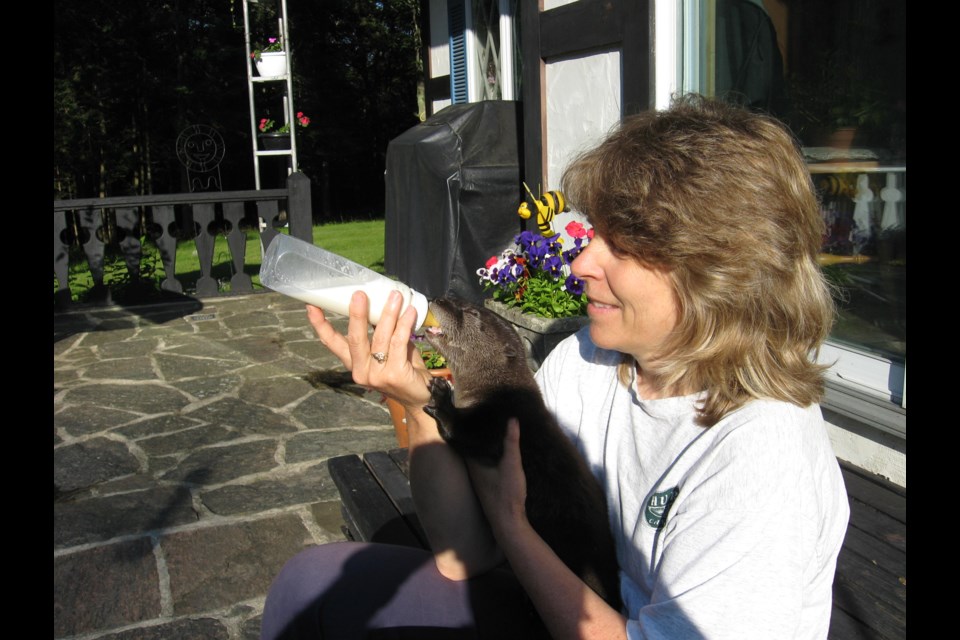A beloved river otter at the Toronto Zoo that passed away last week had first called Northwestern Ontario home.
Talise, a popular attraction at the zoo, had originally been found orphaned in Kenora 13 years ago.
Laureen Parsons, a Kenora resident trained as a wildlife custodian which allowed her to rehabilitate wild animals, took care of the otter before she was given to the zoo a couple of months later.
Parsons said she was surprised and sad to hear about the otter's passing.
“[The timing] was funny because I was just thinking about her a couple of days ago and then to hear all of a sudden that she passed, I got to tell you it hurt,” she said. “But, I think she had a good life there and it was just sad to hear. Usually you release animals back [in the wild] and you don't know what's happened to them or, if they've died or been killed or anything like that.”
She said her husband saw it on Facebook and showed it to her Monday morning.
“I was surprised when I Googled it, how many news agencies had picked it up,” she said.
Parsons said she cared for the otter shortly after it was found. She said at that point she had taken care of other animals, but this was her first otter.
She said when she first got it, her eyes were still closed.
“She was bottle fed for most of the time I had her and in the meantime, I had broken my ankle just before getting her. My husband was working for the military in Kingston, so he wasn't home. So it was just me and the cat and now an otter kit,” she said with a laugh when recounting the memory.
Parsons said once the otter opened her eyes, it would run around and sometimes come with her in the truck when she did field work for the Ministry of Natural Resources as a forestry technician, from which she’s now retired.
“I was going to work on a e-scooter when my ankle was broken. So I had one of those [pet carrier] knapsacks. So I just put her in there and we'd go to work and she'd sleep a lot of the day, next to my desk and she’d come outside for coffee with us and stuff,” she said.
“Just basically did that a lot and, you know, and I fed her and let her run, ran in the yard at our house and let her learn to swim in the bathtub and, they just went on for several weeks or they said it was three months, but it didn't seem like three months.”
Parsons said otters like to stay really close.
She said they make a distinctive noise, which is like a chirp.
“It’s very loud and, that was one of my biggest pet peeves with her when I had her at home and it was feeding time or she needed attention or something, she would do this loud chirp and it would just bust your eardrums,” she said. “It's not people's normal problems but it was like, ‘holy crap buddy’. She was very loud and she liked playing around but she would never go very far away from me.”
She said the otter was a great little [animal], “she kind of freaked out a little bit with the swimming sometimes if I got too far away or I swam too fast or whatever.”
“I was her mom. [When] she came to me, her eyes hadn't opened yet. So I was her first contact and she didn't know any different, but she was a lot of fun to have,” she said.
Parsons said she realized the otter couldn't be let go to the wild because it was imprinted and, “had we released her to the wild, she wouldn't be able to fend for herself or anything because she was too used to human contact.”
So she said she had to face the fact that it needed to go somewhere and one of her colleagues had a contact at the Toronto Zoo, which said they would take her.
“Eventually it came time. She couldn't go in the [flight] cabin with me because she was technically a wild animal,” she said. “And we flew down to Toronto and, my friend picked me up who is also a wildlife technician. So I stayed at my parents for a few days and they have a large property and we also went for a swim down in the lake and stuff.”
She said her husband came in from Kingston and a few days later they drove down and took the otter to the zoo.
“We went in and they showed me where they were putting her and stuff and I got to say my goodbye and she was in quarantine for probably over a month just in case she had some parasites or something.”
Parsons said the zoo named the otter.
“When you're doing rehab, you're not supposed to name anything,” she said.
While Parsons said she never saw the otter again, her husband did pop in to see her once on one of his work trips and they sponsored her for a couple of years.
“It was my Christmas present to my nieces at that point [where] you can sponsor an animal,” she said.
